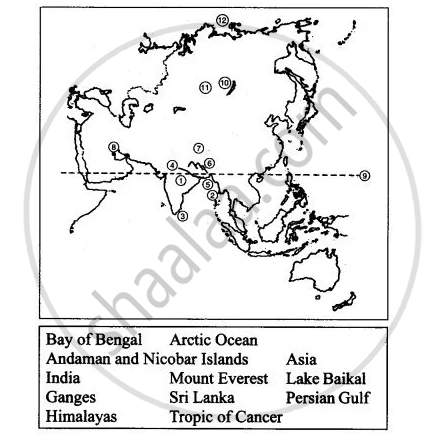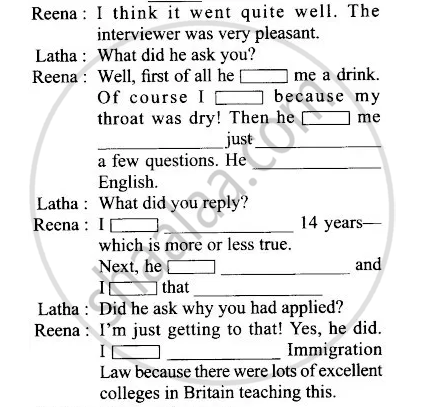Advertisements
Advertisements
प्रश्न
Carbon Footprint - Project Work
A carbon footprint is a representation of the effect human activities have on the climate in terms of the total amount of greenhouse gases produced (measured in units of carbon dioxide). So, it is a measure of the impact we make individually on the earth; by the choices we make regarding our lifestyle. Many activities generate carbon emissions, which contribute towards accelerating global warming and climate change.
Total carbon footprint/ emission quantification would include energy emissions from human activities - such as, from heat, light, power and refrigeration and all transport related emissions from cars, freight and distribution.
By measuring the carbon footprint through such tools as carbon calculators, we can get a better sense of what the individual impact is and which parts of our lifestyle deserve strict regulation.
In groups, choose and research any one aspect of how we are leaving carbon footprints and how can we modify our lifestyle. Each group will then make a project on the various aspects.
उत्तर
Class Activity
APPEARS IN
संबंधित प्रश्न
Answer the following question briefly:
What did the Professor mean by “intelligent reading”?
Teacher/ Student to read out the first part given . After you listen, answer the following questions :
Nuclear war has broken out in Europe. A school in England has been evacuated by airplane to an unknown destination. While flying over a tropical region, the plane is shot down and it bursts into flames , but the body of the plane containing the passengers falls to earth safely. A few boys (Ralph, Jack, Roger, Simon, Piggy and others) manage to scramble out. They have landed on an unnamed island which has coral reefs, beaches, caves and fruit trees. The novel tells their story.
a. What do you think happened to the boys and the plane they were flying in?
b. What happened to the other part of the plane?
c. How did Ralph attract the attention of the other boys?
d. What were the names of the first three boys who came to the meeting?
e. Why do you think the groups of boys were marching in two parallel lines?
f. Do you think there were any adults on the island? Why/ Why not?
g. Can you predict what happened to the boys next? For example, how did they organise themselves? What about shelter and food?
In Units 1 and 2 you learnt and practised the skill of deducing the meanings of new words by using other words in the given context. Now use that skill to deduce the meanings of words in the article you have read. Here is an example.
(a) They are solitary creatures with the exception of the mothers and calves and breeding pairs, although they sometimes congregate at bathing places.

Deduce the meanings of the following words from the passage you have just read, using other words in the context to help you. Copy and complete the following :
| Word | Words/clues that helped me | what I think the word means | what the dictionary says | were you (✓) (tick mark) or (x) |
| confined | ||||
| ranged | ||||
| overlapping | ||||
| bobbing | ||||
| olfactory | ||||
| aggregation | ||||
| plummeting | ||||
| mortality | ||||
| vulnerable | ||||
| poached |
Edit the following narrative by choosing the appropriate word from the options given at the end of the paragraph.
(a) Wander along the streets of New York City, my daughters and (b) me stop at shoe stores wherever we (c) happens to be. This is their choice. These women, who as little (d) girl, teetered around the house (e) balances like cranes in my mother’s high heels. I (f) sits on the bench and wait while they try on shoe (g) on shoe readjusting their positions in (h) a mirror, eyes downcast considering their feet.
“So?” one of them (i) will ask me. “What do you think of these?” “I love them,” I say about (j) all pairs.
| (a) (i) wandered (ii) wandering (iii) were wandering (iv) was wandering |
| (b) (i) they (ii) I (iii) we (iv) us |
| (c) (i) happen (ii) happened (iii) are happening (iv) are happened |
| (d) (i) girls (ii) woman (iii) boys (iv) people |
| (e) (i) are balancing (ii) is balancing (iii) balanced (iv) balance |
| (f) (i) sit (ii) am sitting (iii) sat (iv) was sitting |
| (g) (i) after (ii) before (iii) in (iv) by |
| (h) (i) that (ii) the (iii) their (iv) x |
| (i) (i) is asking (ii) asks (iii) are asking (iv) asked |
| (j) (i) every (ii) few (iii) some (iv) a |
Look at the numbers on the map, and match them with the names given in the box below.

The table below provides you with a list of modals that are used to express necessity and permission.
| Necessity I obligation | Permission |
|
Positive must obeying have to authority need to ought to right thing should to do |
Positive can (less formal) may (more formal)
|
|
Negative must not cannot ought not to |
Negative need not do not have to
|
Now prepare a graph based on the students' response to the survey you conducted in Question 2. Then write a report for the newspaper taking the help of Question 5, Question 3 and Question 6. You may follow this pattern:
Paragraph 1 : A suitable introduction as in B.4.
Paragraph 2 : Hours per week spent on different activities - classes VI, IX and XI compared.
Paragraph 3 : How extra time would be used - Classes VI, IX and XI compared.
Paragraph 4 : Boys and girls compared - Classes VI, IX and XI
The following words and phrases will be useful to you:
To express proportion
Most __
Many __
The majority of ___
A large number of ___
A small number of ___
Very few ____
Only a few ___
To express frequency
Most of the time ___
Frequently ___
Occasionally ___
Often ____
At times ___
To express comparison and contrast
__ compared with __
On the other hand, ___
In contrast, ___
By comparison, ___
___ however, ___
____ in comparison with ___
You may also find some of the phrases from B.5 useful.
Reported speech in Extended practice.
Read the dialogue between Mr Coomer (Mr C), the British Scholarship Officer, and an applicant, Miss Reena Banerjee (R).
Mr C : Come in, Miss Banerjee.
R : Thank you.
Mr C : Please sit down. Can I get you a cup of coffee or a cold drink?
R : Yes thank you. A cold drink, please.
Mr C : I’m just going to ask you a few questions. How long have you been studying English?
R : I’ve had private as well as school lessons for 14 years.
Mr C : Just as background information, what do you do in your spare time?
R : I’ve always enjoyed drama, and also debating.
Mr C : Why do you wish to obtain a scholarship to study in Britain?
R : Well, I’m interested in studying Immigration Law, and there are several good colleges in Britain dealing with his.
Mr C : Very interesting. Finally, do you know that the grant only covers teaching fees?
What about your living expenses?
R : My sister will pay for my personal expenses.
Mr C : Well, Miss Banerjee, we’ll be writing to you next week. Thank you for coming.
Reena meets her friend, Latha, after the interview. She is very excited and tells Latha exactly what happened. Fill in the spaces using reported speech.
Fill in the [boxes] with reporting verbs.


You are on the editorial board for the column ‘Your Problems’ in The Teenager magazine. You have received these two letters asking for your advice. (They appear to have come from the same family)
|
Dear Helpful Avanti My fifteen year old son is crazy about film music. He seems to be wasting all his pocla:t money on these meaningless CDs. He cannot even study without this noise. Though he is good at studies, I remain disturbed about this new obsession. There are all kinds of strange-looking posters on the walls of his study and he always wears those gaudy T-shirts and faded patched jeans. Also, he is very fond of Junk-food. I fear he is breaking all links with our culture. |
|
Dear Helpful Avanti I love film music and I have bought a lot of CDs from my pocket-money allowance. But whenever I switch on my CD-player, my father frowns and orders me to switch off the 'jarring noise'. He calls it 'cheap' and 'uncivilised' stuff. It is not that I do not like classical music, but when I am with my friends, we listen to film music. I like Indian clothes and food. But, I also like to wear western clothes and eat continental food occasionally. I do not like to disobey my parents, but I do not want to give up my music and other interests. |
In pairs, decide what advice to give to each of them. Then write one letter each, so that both father and son get a reply from The Teenager. Remember to use some of the language in Question 5.
Either in groups or individually, make a power-point presentation on either of the two games. Incorporate points from the table above and any other interesting information I detail.
